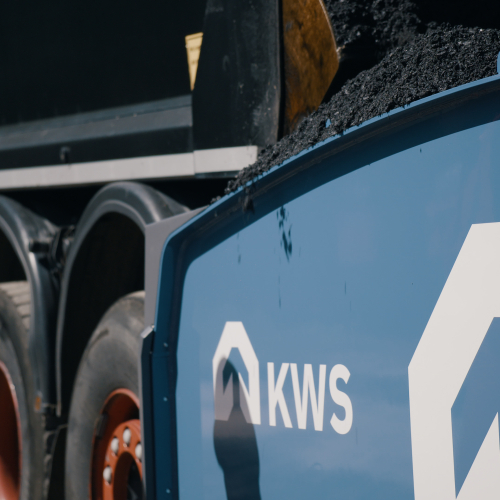KWS lays first meters of asphalt with electric asphalt spreader
KWS, part of VolkerWessels Infrastructure, has laid the first meters of asphalt on the Innovation Lane A58 near Oirschot using its electric asphalt spreader. The development and deployment of this innovative asphalt spreader, which emits no CO2 or fine particles, is in line with KWS's ambition to be a sustainable business and is the next step towards completely emission-free work in 2030. The electric asphalt spreader will soon be used on other projects and will lead to a saving of 46 tons of CO2 per year.

Green and clean
In terms of performance, the electric asphalt spreader is no less than a traditionally powered spreader. It is a new machine that, by partner Urban Mobility Systems, has been fully electrified. This zero-emission model uses an interchangeable and safe LFP battery pack. The interchangeable system allows the machine to be used basically 24/7. The LFP battery has a longer life than standard batteries within the industry, requires little to no maintenance and is 100% recyclable. In addition, it is above all extremely safe, which was paramount in the development of the electric asphalt spreader. The safety of our people has the highest priority.
Translated with www.DeepL.com/Translator (free version)
Raymond van de Stadt, Director of Asphalt Construction at KWS: "As an innovative road and hydraulic engineering company, KWS is a leader in the field of purchasing and using sustainable equipment. With the investment in the electric asphalt spreader, KWS is taking specific steps towards our sustainable ambition of being emission free by 2030. We are striving for a completely emission-free asphalt set in 2023, with the introduction of this new electric spreader we are taking the next step in achieving this ambition. We cannot do this alone, so we are pleased with clients like Rijkswaterstaat who give contractors the space to innovate and develop."
Innovation lane A58
The development of the electric asphalt spreader was accelerated by the Innovation Lane A58 Kloosters project. By setting a tender amount in the tender phase for all bidders and using the best price-quality ratio (BPKV criteria) in the field of Zero Emission construction and innovations, Rijkswaterstaat encourages the market to be distinctive. VolkerWessels companies KWS and Gebr. van Kessel are jointly executing this special contract.
Innovation manager Rijkswaterstaat Matthé van der Bruggen: "The electric asphalt spreader of KWS and an emission-free construction site are inextricably linked. I am pleased that KWS is investing in electric construction equipment. And proud that together with the Innovation Lane A58 Kloosters we are taking another step towards sustainable road construction."